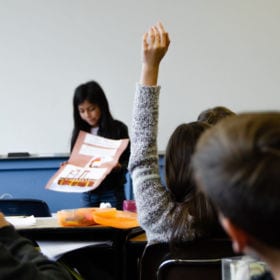
September 27, 2020 Community Stories
Children’s Mental Health Gets a Boost from Health Law Advocates
When schools in Hampden County closed during the pandemic, remote learning posed a tremendous challenge for teachers, parents, and students. Kids with mental health needs confronted unique barriers, says attorney Mara Shulman of Health Law Advocates (HLA).

Special education programs did not transition easily to remote learning platforms. Students suddenly lost routines they relied on, paraprofessionals who assisted them one-on-one, and in-person, school-based counseling. The pandemic caused both a spike in the need for mental health services and greater difficulties in accessing services.
Shulman works in HLA’s Mental Health Advocacy Program for Kids (MHAP for Kids), based at Enlace de Familias, Holyoke’s Family Resource Center. There, she represents parents whose children have unmet mental health needs. She helps parents access mental health services and special education supports their children require to succeed in school.
A grant from the COVID-19 Response Fund, hosted by the Community Foundation, has enabled MHAP for Kids to advocate on behalf of 34 Hampden County families from Holyoke, Springfield, Chicopee, Palmer, and Westfield. The grant has helped to maintain kids’ learning and mental health through the ups and downs of the pandemic.
“For any family during normal times, it can be tough to navigate the special education system,” says Shulman. “The demand for our services has definitely increased. I’m here to make sure that parents get the information they need and students get the services they need to learn and grow.”
In addition to one-on-one advocacy, Shulman has been busy conducting trainings in the community for providers and for families to help them understand the landscape.
When youth require a higher level of care, Shulman coordinates all the parties – schools, insurance, mental health providers, in-patient programs, and families. Her approach is collaborative, but she is ready to take legal action if necessary, as she did recently for a student who required an extended special education evaluation. After Shulman filed an administrative hearing request, the school district agreed to fund the evaluation. “This is a major step toward this young person getting what they need to be successful,” says Shulman.
MHAP for Kids also aims to interrupt the school-to-prison pipeline that can ensnare kids with mental health needs. “Schools may perceive these kids as exhibiting behavioral problems, and over-discipline them, when at the root there is an unmet mental health need. But if kids get appropriate services, we can keep them out of court—where they don’t belong,” says Shulman.
Shulman also noted that the school-to-prison pipeline disproportionately impacts students of color due to systemic racism and unconscious bias. “The pandemic has made these inequities more visible, and we’re here to fight those inequities.”

